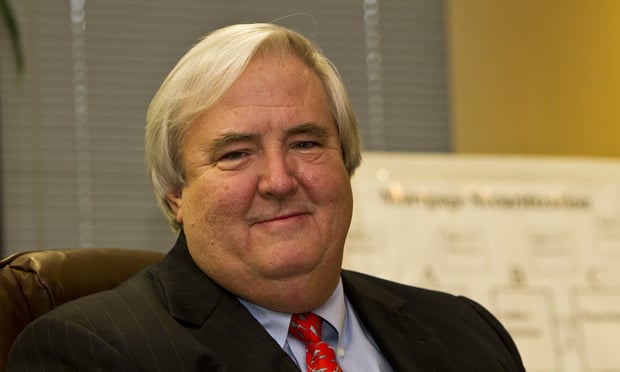Disbarred Real Estate Lawyer's 'Light' Sentence Outrages Former Clients
Robert T. Thompson Jr. was sentenced to six months in prison for taking payments from clients facing foreclosure, then failing to follow through on the work.
September 24, 2018 at 12:48 PM
7 minute read
 Robert Thompson Jr. (Photo: John Disney/ALM)
Robert Thompson Jr. (Photo: John Disney/ALM)
Former Toronto Maple Leafs hockey enforcer Kurt Walker was on his deathbed when he took a parting shot at his former lawyer, Robert T. Thompson Jr.
“Make sure Thompson doesn't get away,” Walker instructed Atlanta businessman Mick Barron. Like Walker, Barron said Thompson cheated him of legal fees he paid for work the lawyer never performed. The Buckhead real estate attorney's failure to follow through after being paid cost Walker his house, Barron said.
On Friday, Fulton County Superior Court Judge Constance Russell ordered Thompson to serve six months behind bars as part of a five-year prison term after the disbarred lawyer pleaded guilty to multiple thefts from former clients, a spokesman for Fulton County District Attorney Paul Howard said.
A Fulton County grand jury indicted Thompson last year on 30 counts of theft for stealing more than $250,000 from his clients.
Thompson, who was disbarred by the state Supreme Court in 2015, and his counsel had sought a probated sentence in negotiations with county prosecutors, who pushed for prison time, the DA's spokesman said.
Russell also ordered Thompson to repay $100,000 to a list of former clients who paid him for work he never did, but the judge gave him two years to pay the restitution. Russell also barred Thompson from practicing law and did not grant him status as a first offender. If a defendant receives first offender status in Georgia, his arrest and conviction will be scrubbed from the public record once the sentence is successfully completed.
Thompson must turn himself in to state prison authorities on Oct. 1.
Thompson's attorney, Joshua Schiffer of Atlanta's ChancoSchiffer, said in a written statement that Thompson wished to thank “the many citizens and bar members who stood by him and is very pleased that Judge Russell exercised her good judgment in ending this difficult case.”
Thompson served for years “as a leading member” of the State Bar of Georgia's Lawyers Assistance Program “and we appreciate the district attorney agreeing to punishment ranges that valued his contributions,” Schiffer said.
The Lawyers Assistance Program offers confidential peer-to-peer help for lawyers suffering from stress, depression, addiction or other personal issues.
“Our concern in the matter focused on Mr. Thompson being allowed to care for his three teenage children, as well as his ill brother, and we now ask for his privacy as his public career has ended,” Schiffer said.
Barron called Friday's sentencing “a bad day for justice.”
“This sentence cannot be justice if Thompson pleaded guilty to to [30] felony counts,” of theft, he said. Thompson's victims, many of whom lost their homes after they turned to him for help in salvaging underwater mortgages during the recession, “are outraged,” Barron said.
Others, like Walker—who founded the charity Dignity After Hockey to help former professional athletes with serious spine and brain injuries—died while waiting for Thompson to go to jail, Barron said.
Walker was one of those who turned to Thompson for help saving his house. The former hockey player had secured a home mortgage from Taylor, Bean & Whitaker, which collapsed in 2009 after federal authorities launched a criminal investigation that resulted in the company's suspension as a Federal Housing Administration lender, Barron said. Walker ultimately lost his house and the legal fees he paid Thompson, Barron said.
“I have no hate for Thompson,” said Barron, who embarked in 2012 on what became a mission to strip Thompson of his law license and have him prosecuted. “In the very beginning, I told him to ask our forgiveness, and let us collect on his malpractice insurance.”
Barron said Thompson replied that God forgives—but Thompson would ”see us all in court.”
“Apparently, God is not the only one that forgives,” Barron said. “The judge does, too, with that 'member of the legal club' sentence.”
“I wish the victims would have been able to voice their opinions before [Friday's] sentencing,” he added. Thompson was expected to go to trial Tuesday.
Thompson's lawyers and prosecutors spent Friday fine-tuning a guilty plea and debating over whether Thompson would serve any time behind bars, Schiffer said. When Thompson entered a non-negotiated plea late Friday, Schiffer said he and prosecutors agreed Thompson could serve just 60 days in prison. The judge disagreed, Schiffer said. Barron said just one of Thompson's victims was in court and was able to ask Russell that Thompson serve time.
“Everyone thinks it's light because a lot of people lost houses,” Barron said of the sentence imposed. “A lot of people were giving Thompson their last bit of money in the hope he would help them.” Instead, Thompson “was making promises” he wouldn't keep, Barron.
Thompson's plea and sentence resolve years of criminal and civil complaints against the Buckhead lawyer who claimed to specialize in staving off foreclosures. Many of his victims said they recruited Thompson after a client dubbed him “like Robin Hood” because “he takes from the banks and gives to the poor.”
But Barron said Thompson was more like the sheriff of Nottingham, who stole from those in dire financial straits to pad his own pockets. Thompson skipped court appearances and failed to file court papers after receiving legal fees from his clients.
Warning signs that Thompson was not effectively representing his clients, or himself, began surfacing in 2013 in the U.S. District Court for the Northern District of Georgia in Atlanta.
A civil suit Thompson filed on behalf of one client against her mortgager was dismissed after Northern District Judge Richard Story enumerated a list of Thompson's failures, including a failure to comply with a magistrate judge's order. That magistrate judge, Gerrilyn Brill, sanctioned Thompson for abusing the discovery process by serving last-minute subpoenas for depositions that were never intended to take place.
In 2014, Thompson was also sanctioned by Northern District Senior Judge Charles Pannell Jr., who called Thompson's conduct “reprehensible” because the lawyer made “serious claims … without a proper basis” against another Atlanta attorney in a federal lawsuit he filed in 2012. A third judge, U.S. Magistrate Judge Linda Walker, dismissed a lawsuit Thompson filed to save his own Buckhead residence from foreclosure after finding Thompson legal theories “difficult to decipher,” that his complaint was drafted in a “confusing manner” and that he failed to identify “which defendant took which action and when.” She also suggested that continuing to entertain Thompson's pleadings “would interfere with the Court's ability to protect its docket from frivolous and abusive litigation.”
Beginning in May 2014, seven of Thompson's clients filed reports with Atlanta police accusing him of taking more than $75,000 in retainers while providing few, if any, services. After police forwarded the case to Fulton County District Attorney Paul Howard, prosecutors and investigators identified 22 additional victims who paid more than $175,000 in fees, according to Howard's staff.
Multiple clients also complained to the State Bar of Georgia, which suspended Thompson's license in 2014. Thompson was disbarred in February 2015 over his refusal to return a retainer for a foreclosure his client subsequently negotiated herself without Thompson's involvement.
This content has been archived. It is available through our partners, LexisNexis® and Bloomberg Law.
To view this content, please continue to their sites.
Not a Lexis Subscriber?
Subscribe Now
Not a Bloomberg Law Subscriber?
Subscribe Now
NOT FOR REPRINT
© 2025 ALM Global, LLC, All Rights Reserved. Request academic re-use from www.copyright.com. All other uses, submit a request to [email protected]. For more information visit Asset & Logo Licensing.
You Might Like
View All
Law Firms Expand Scope of Immigration Expertise Amid Blitz of Trump Orders
6 minute read
Bass Berry & Sims Relocates to Nashville Office Designed to Encourage Collaboration, Inclusion
4 minute read
Gunderson Dettmer Opens Atlanta Office With 3 Partners From Morris Manning
3 minute read
Trending Stories
- 1Uber Files RICO Suit Against Plaintiff-Side Firms Alleging Fraudulent Injury Claims
- 2The Law Firm Disrupted: Scrutinizing the Elephant More Than the Mouse
- 3Inherent Diminished Value Damages Unavailable to 3rd-Party Claimants, Court Says
- 4Pa. Defense Firm Sued by Client Over Ex-Eagles Player's $43.5M Med Mal Win
- 5Losses Mount at Morris Manning, but Departing Ex-Chair Stays Bullish About His Old Firm's Future
Who Got The Work
J. Brugh Lower of Gibbons has entered an appearance for industrial equipment supplier Devco Corporation in a pending trademark infringement lawsuit. The suit, accusing the defendant of selling knock-off Graco products, was filed Dec. 18 in New Jersey District Court by Rivkin Radler on behalf of Graco Inc. and Graco Minnesota. The case, assigned to U.S. District Judge Zahid N. Quraishi, is 3:24-cv-11294, Graco Inc. et al v. Devco Corporation.
Who Got The Work
Rebecca Maller-Stein and Kent A. Yalowitz of Arnold & Porter Kaye Scholer have entered their appearances for Hanaco Venture Capital and its executives, Lior Prosor and David Frankel, in a pending securities lawsuit. The action, filed on Dec. 24 in New York Southern District Court by Zell, Aron & Co. on behalf of Goldeneye Advisors, accuses the defendants of negligently and fraudulently managing the plaintiff's $1 million investment. The case, assigned to U.S. District Judge Vernon S. Broderick, is 1:24-cv-09918, Goldeneye Advisors, LLC v. Hanaco Venture Capital, Ltd. et al.
Who Got The Work
Attorneys from A&O Shearman has stepped in as defense counsel for Toronto-Dominion Bank and other defendants in a pending securities class action. The suit, filed Dec. 11 in New York Southern District Court by Bleichmar Fonti & Auld, accuses the defendants of concealing the bank's 'pervasive' deficiencies in regards to its compliance with the Bank Secrecy Act and the quality of its anti-money laundering controls. The case, assigned to U.S. District Judge Arun Subramanian, is 1:24-cv-09445, Gonzalez v. The Toronto-Dominion Bank et al.
Who Got The Work
Crown Castle International, a Pennsylvania company providing shared communications infrastructure, has turned to Luke D. Wolf of Gordon Rees Scully Mansukhani to fend off a pending breach-of-contract lawsuit. The court action, filed Nov. 25 in Michigan Eastern District Court by Hooper Hathaway PC on behalf of The Town Residences LLC, accuses Crown Castle of failing to transfer approximately $30,000 in utility payments from T-Mobile in breach of a roof-top lease and assignment agreement. The case, assigned to U.S. District Judge Susan K. Declercq, is 2:24-cv-13131, The Town Residences LLC v. T-Mobile US, Inc. et al.
Who Got The Work
Wilfred P. Coronato and Daniel M. Schwartz of McCarter & English have stepped in as defense counsel to Electrolux Home Products Inc. in a pending product liability lawsuit. The court action, filed Nov. 26 in New York Eastern District Court by Poulos Lopiccolo PC and Nagel Rice LLP on behalf of David Stern, alleges that the defendant's refrigerators’ drawers and shelving repeatedly break and fall apart within months after purchase. The case, assigned to U.S. District Judge Joan M. Azrack, is 2:24-cv-08204, Stern v. Electrolux Home Products, Inc.
Featured Firms
Law Offices of Gary Martin Hays & Associates, P.C.
(470) 294-1674
Law Offices of Mark E. Salomone
(857) 444-6468
Smith & Hassler
(713) 739-1250






